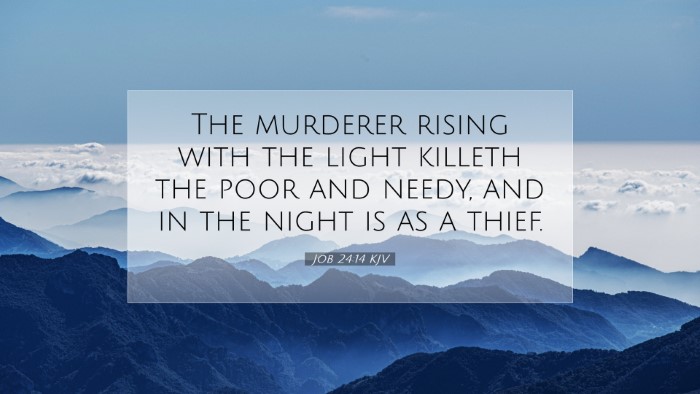Old Testament
Genesis Exodus Leviticus Numbers Deuteronomy Joshua Judges Ruth 1 Samuel 2 Samuel 1 Kings 2 Kings 1 Chronicles 2 Chronicles Ezra Nehemiah Esther Job Psalms Proverbs Ecclesiastes Song of Solomon Isaiah Jeremiah Lamentations Ezekiel Daniel Hosea Joel Amos Obadiah Jonah Micah Nahum Habakkuk Zephaniah Haggai Zechariah MalachiJob 24:14
Job 24:14 KJV
The murderer rising with the light killeth the poor and needy, and in the night is as a thief.
Job 24:14 Bible Commentary
Commentary on Job 24:14
Verse Reference: Job 24:14 - "The murderer rising with the light killeth the poor and needy, and in the night is as a thief."
Introduction
The book of Job grapples with profound themes of suffering, justice, and the nature of God. In this verse, Job draws attention to the wickedness displayed in society, particularly the violence inflicted upon the vulnerable by evildoers. This commentary consolidates insights from renowned public domain commentators, aiming to provide a comprehensive understanding of the text for pastors, students, theologians, and scholars.
Contextual Analysis
Job 24 forms part of Job's response to his friends, who uphold the belief that suffering is always a direct consequence of sin. In contrast, Job's observations of the world reveal the presence of injustice and the plight of the innocent, challenging the simplistic retributive theology held by his companions.
- Role of the Innocent: The "poor and needy" that Job mentions symbolize the innocence often victimized by those in power.
- Nature of Evil: Job elucidates the idea that evil exists in this world and efforts to rationalize suffering must account for the actions of the wicked.
Commentary Insights
Matthew Henry's Perspective
Henry emphasizes the depravity of human nature when unchecked by divine law. He explains that the "murderer rising with the light" contrasts starkly with the metaphor of light symbolizing goodness and order. The murderer, in this sense, signifies a deliberate choice to forsake righteousness for selfish gain, reflecting a moral darkness that prevails in the heart of man.
Albert Barnes’ Interpretation
Barnes points out that this verse reveals a disturbing reality: the transgression of moral boundaries. He elaborates that the murderer operates under the cover of dawn—the very time when light traditionally represents hope and renewal. Instead, this character uses it to enact violence, thus portraying the depth of moral decay. Barnes suggests that this verse poses a rhetorical question regarding divine justice, highlighting the contrast between perceived order and actual chaos in human affairs.
Adam Clarke's Exegesis
Clarke offers a historical context, illustrating how the plight of the poor and needy was prevalent in Job's time, much like today. He argues that Job meticulously observes the alignment of wealth and power with moral failings. Clarke further underscores that the night symbolizes darkness—both literal and figurative—wherein sin thrives, demonstrating the need for divine intervention in human affairs.
Theological Reflections
This verse prompts significant theological reflections on the nature of evil and the dilemmas of justice within God’s creation. The notion of a God who permits the innocent to suffer raises questions about divine sovereignty and human freedom. The commentaries suggest the following points:
- The Problem of Evil: The existence of violence and injustice showcases the reality of evil in the world, challenging believers to contend with why God allows such suffering.
- Divine Justice: While it appears that the wicked prosper, the underlying assurance of God’s ultimate justice gives hope to the faithful.
- Human Responsibility: Job highlights the role of human choices, demonstrating that moral failure and oppression arise from a neglect of the divine commandments.
Practical Applications
For pastors and church leaders, Job 24:14 serves as a stark reminder of the moral responsibilities held by the community of believers. The realities outlined in this verse encourage:
- Advocacy for the Vulnerable: The church must actively work to protect the poor and needy, embodying Christ’s love in tangible ways.
- Ethical Conduct: Encouraging congregants to live in ways that reflect God's justice, avoiding complacency in the face of social evils.
- Education on Suffering: Teaching that suffering does not always correlate with personal sin and that God's purposes are often beyond human understanding.
Conclusion
The insights drawn from Job 24:14 unveil the complexity of human experience and the pervasive issue of evil in the world. Through the combined voices of Matthew Henry, Albert Barnes, and Adam Clarke, a nuanced understanding emerges that seeks to uphold God's justice while acknowledging the grim realities faced by the innocent. This verse not only challenges readers to reflect on the nature of evil but also encourages active participation in promoting justice and compassion within society.


